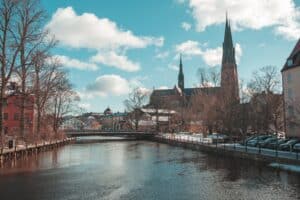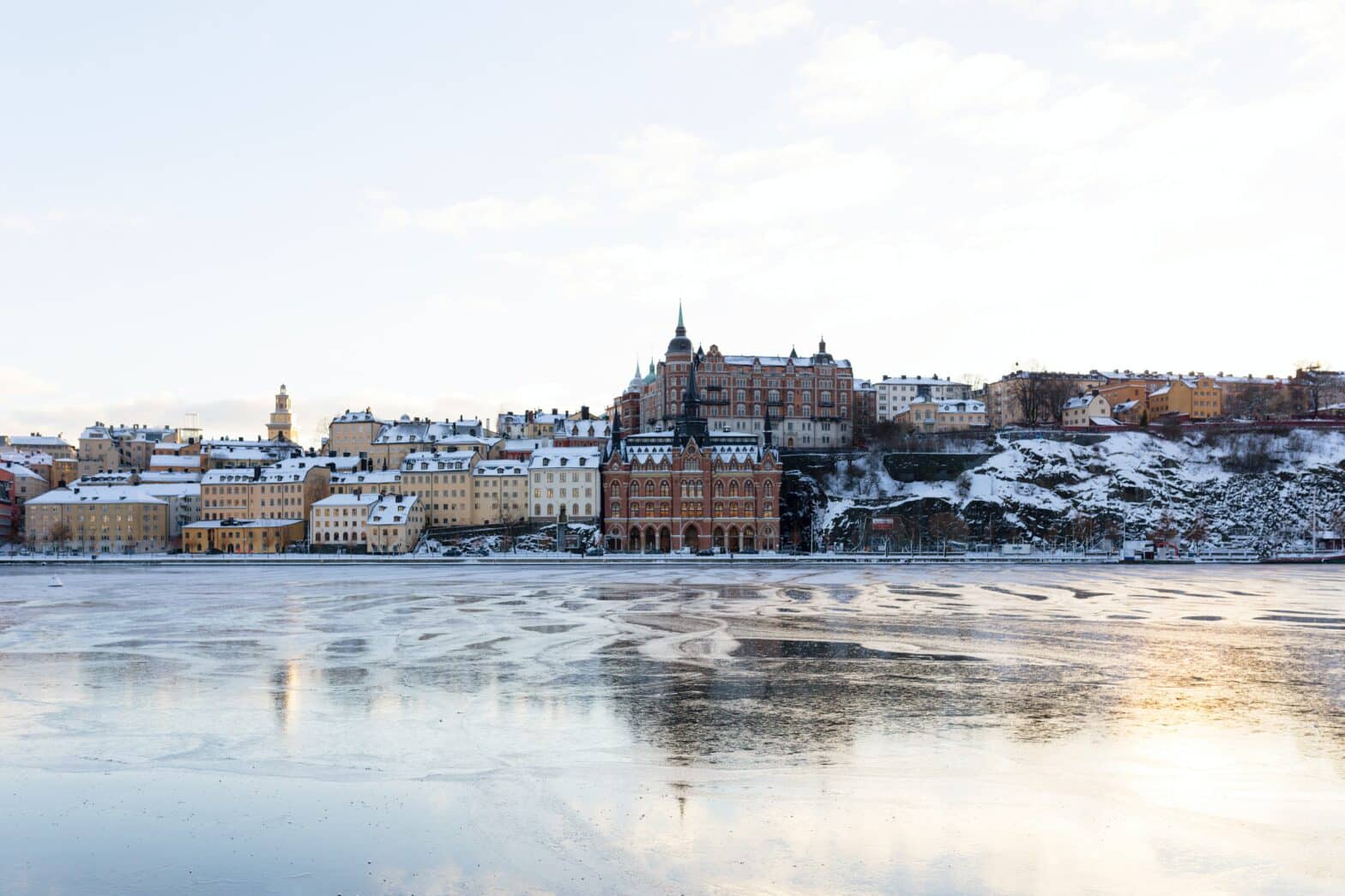Sweden is home to a wide variety of expatriates, including nature lovers, culture enthusiasts, incorrigible gourmets, and intrepid adventurers. The land of the Svea has a lot to offer to foreigners: a new way of life (lagom), work opportunities and happiness in discovering new pursuits.
Whether you’re looking to live in a winter wonderland or bustling metropolis for a year or more, Foyer Global Health is here to guide you to embrace the magic of your new adventure in Scandinavia.
Moving to Sweden: some formalities
While EU and EEA nationals no longer need a visa or a residence permit to live in Sweden, third-country nationals such as Canadians or Americans must contact the Swedish embassy in their home country to obtain a residence permit before moving.
Upon arrival to Sweden, here are the formalities you will have to complete:
- Provided that you are working, studying, setting up a business in Sweden or have sufficient funds to support yourself, register with the Swedish Migration Board (Migrationsverket) to obtain the right of residence (uppehållsrätt). If none of these apply to you, you must nonetheless apply for a residence permit with the same authorities.
- You will be required to obtain your personal identification number (known as personnummer): Once you have obtained a residence permit, you must apply for your personal number at the local branch of the Swedish Tax Agency (Skatteverket). This personal number is necessary for all formalities in Sweden.
- Registering with the Swedish social security system is also required (see Försäkringskassan).
Moving to Sweden – pros and cons
Advantages:
- Excellent quality of life
- Nature is everywhere and Sweden is the top country for green-living
- Attractive salaries and a dynamic job market
- Excellent public transport system
- Sweden is one of the happiest countries in the world (ranked 6th in the World Happiness Report 2023)
- Swedish lifestyle places great emphasis on work-life balance
- Sweden is the best place to raise children according to a UNICEF report
- Sweden is one of the best places to be a woman
- A world-class education system
- An efficient healthcare system
- Plenty of places to travel to and explore

Disadvantages :
- Dark long winters
- High cost of living (housing, restaurants, food, everyday items)
- Taxes: an average 32% income tax
- Swedish language can be a barrier to integration
What are the best places to live in Sweden for an expat?
Stockholm, known as the Venice of the North, is the ideal destination for urban and cosmopolitan souls who love the outdoors as much as the elegance of a big city. It is a favourite city for expats, especially English speakers, who enjoy the vibrant nightlife, safety, cleanliness, museums and culinary scene. However, accommodation is very expensive!

Uppsala offers a pleasant living environment for expats. It is home to the country’s oldest university and has plenty of green spaces, shopping venues, bars, dining options and museums. It is a popular city among students and young expatriate workers. Interestingly, 51 different languages are spoken here. Beware, the job market is quite competitive!

Gothenburg, often referred to as the Scandinavian San Francisco, is a port city that attracts foreigners with its trendy bars, delicious restaurants and beautiful natural surroundings. It boasts the country’s best surfing spots, romantic islands, picturesque fishing villages and enchanting forests. Don’t forget your umbrella; it rains a lot in the country’s second largest city!

Malmö is renowned for its excellent art scene, sandy beaches and architectural wonders. It’s a lively, laid-back city that attracts many digital nomads and where you can easily get around by bike. Less expensive than the capital, it offers families the perfect balance between urban living and nature. And the Danish capital is just a stone’s throw away!

Umeå, the largest city in northern Sweden, is perfect for those who enjoy snow, ice and sub-arctic climates. In short: it is the best spot to relocate to if you love long dark winters and high-tech innovation!
How to find accommodation in Sweden?
Sweden’s major cities, including Stockholm, Gothenburg and Malmö, are facing a housing crisis, with long waiting lists to secure rental agreements in the city centre. Many expats choose sublets, which are more readily available. Patience is key!
On the bright side, most accommodation in Sweden is modern and very well equipped. While property prices are higher in the larger cities, you can often find bigger and cheaper housing options in smaller, outlying towns.
It is generally recommended to begin your search for accommodation once you have arrived in Sweden. Please note, however, some landlords may require tenants to have a Personnummer and proof of regular income in the country before agreeing to a rental contract. It is important to be aware of these constraints and plan accordingly.
Useful websites:
The Local (real estate ads)
Getting around
Depending on which city you move to, you can get around Sweden on foot, by car, by bus, by train, by metro, by bike, by water, or by plane all year around! Sweden has an excellent public transport system, with each region managing its own network. Swedish Railway is the country’s main railway company, providing national express train services, intercity trains, and night trains.
In Stockholm, for example, the metro (T-Bana) and bus are convenient modes of transport for moving easily between different parts of the capital. If you are commuting from the suburbs or a nearby city, you can use the pendeltåg. Taxis are not metered; instead, there is a pre-set fare structure that determines the price of the journey according to the route. Just like in the Netherlands, cycling is a very popular way to get around in Sweden, especially in large and medium-sized cities such as Malmö. If you are looking to explore Sweden by water, ferries are also an option, especially if you are traveling from one part of the country to another.
Opening a bank account
In Sweden, most financial transactions are done via bank cards or phones. Formalities to open a bank account in the country will depend on your nationality and the bank you have chosen. In any case you will need your Personnummer, your passport, your social security number, a proof of address and, in some cases, a Swedish national to confirm your identity.
Working in Sweden
Unlike EU and EEA nationals, non-EU nationals must apply for a work permit with the Swedish Migration Board online. You can find all the relevant information here.
Many job vacancies are published in English but still, an expat must prioritise learning the Swedish language if he/she wants to successfully integrate into Swedish society.
Some of the most popular sectors for recruitment in Sweden include trade, education, construction, IT, science and engineering.
If you are looking for a job locally, several websites such as Jobbsafari, Stepstone, Careerbuilder, Monster or the job section of The Local can guide you in your job hunting journey.
Here are a couple of things to know when you work in Sweden:
- A 40-hour working week; 25 days paid holiday
- Parents are entitled to 480 days of parental leave per child to be shared between both parents
- English is often essential for work and many Swedes are proficient in it
- Work/life balance is strongly promoted and implemented
- Physical contact is limited, and people often greet each other with a handshake or a hand gesture saying ‘hej’
- Personal matters or politics are not topics to be discussed in the workplace
- Punctuality is essential; people tend to avoid conflictual situations
- Fika, the Swedish coffee break, is an opportunity to bond with your colleagues
- The corporate culture is, in general, much more relaxed than in other countries such as the UK; Swedes are not very formal and usually call each other by their first name.

Social security and healthcare
A European digital healthcare pioneer, Sweden has an efficient, universal and egalitarian social security and healthcare insurance system. All residents, including expatriates, have social rights, including basic healthcare coverage that gives them access to modern and efficient medical facilities. Medical services are not completely free of charge. Nevertheless, waiting times in the public healthcare sector can be long and it can take quite a long time to see a medical practitioner “face-to-face”. For optimal and worldwide healthcare coverage, it is highly recommended to purchase an international health insurance policy for expatriates.
Education
Public schools in Sweden are known for their high standards and are open to all. Due to the language barrier (classes are taught in Swedish), many foreign residents prefer enrolling their children in private international schools that follow the educational programme of a foreign country, such as the British International School of Stockholm, the Lycée Français Saint-Louis, or the Deutsche Schule Stockholm. Unlike public Swedish schools, they come at a cost.
Some specific Swedish features:
· Fika: the traditional coffee break accompanied by a sweet treat
· Sweden is a leader in gender equality: you will see as many dads pushing prams as mums!
· Lagom: a Swedish way of life that nurtures the right balance in everyday life
· Swedes love spending time outdoors in the fresh air!
Here are some travel ideas
· Explore the beautiful islands of the Stockholm archipelago
· Stroll through the trendy streets of Stockholm’s Sofo district
· Find peace and feel free on the island of Fårö amidst windswept pine forests
· Step back in time at the Foteviken Viking Reserve
· Hunt for the Northern Lights
· Go dog sledding in Lapland
· Take a trip to Copenhagen by crossing the bridge between Denmark and Sweden!
